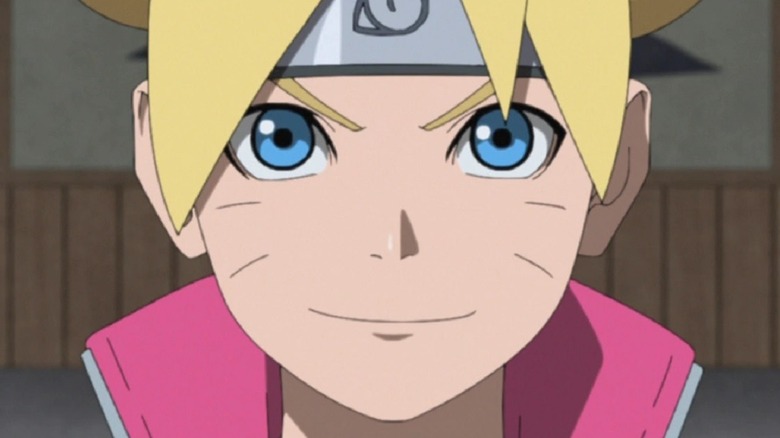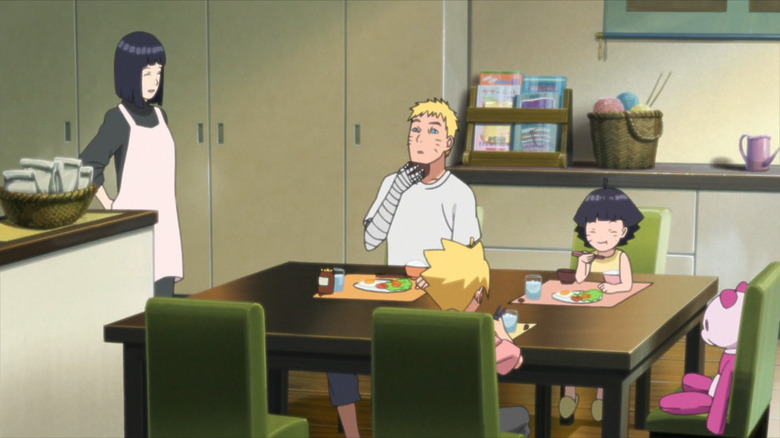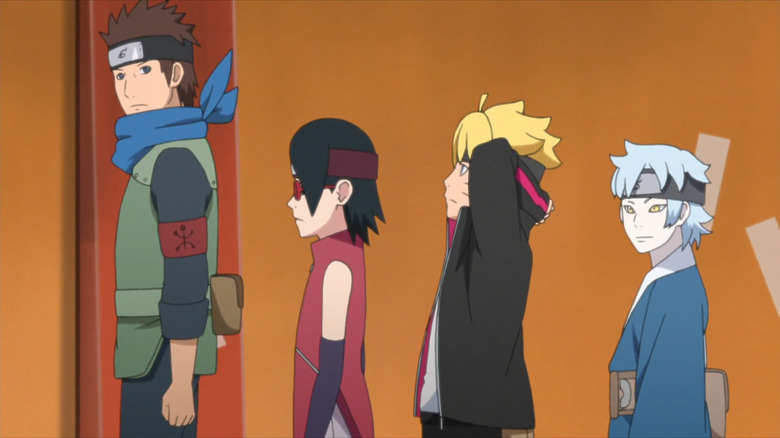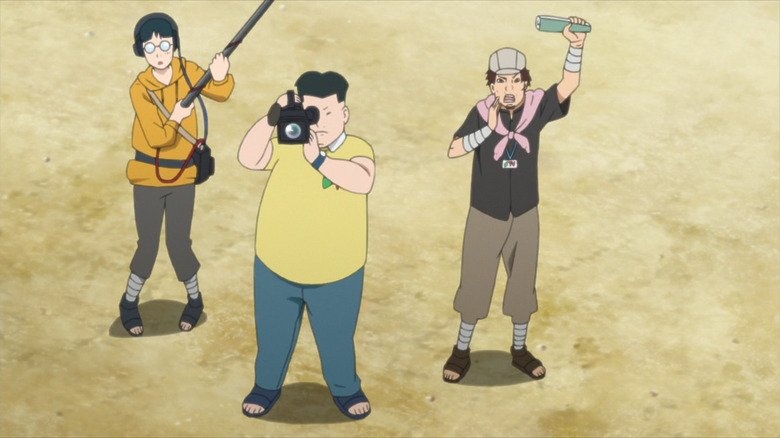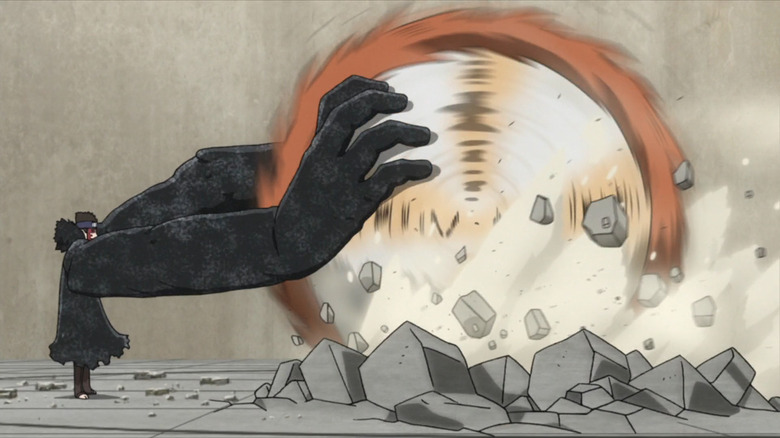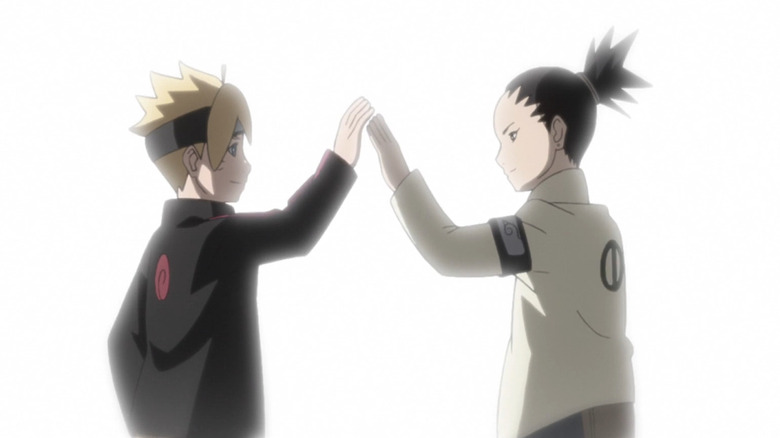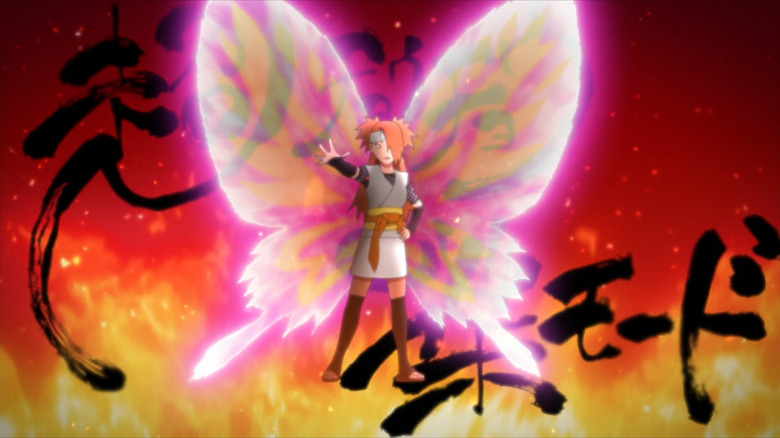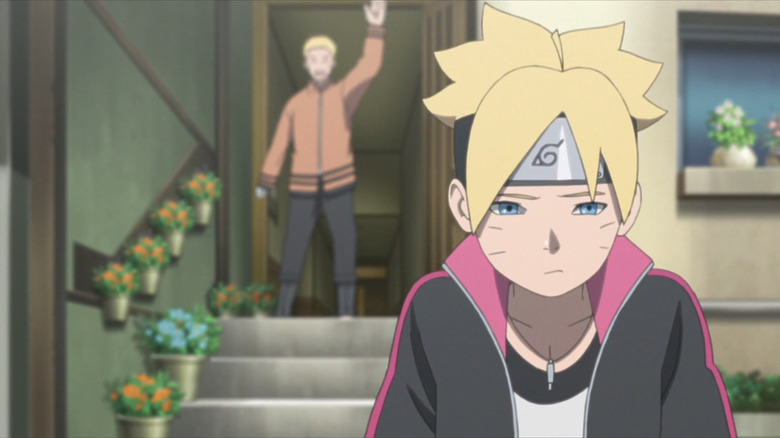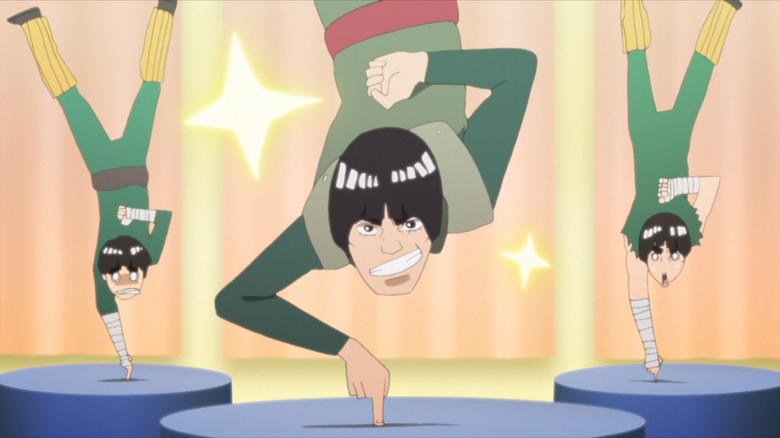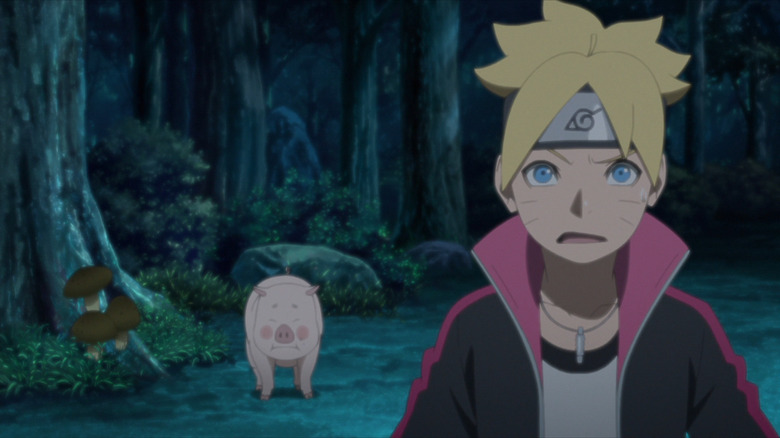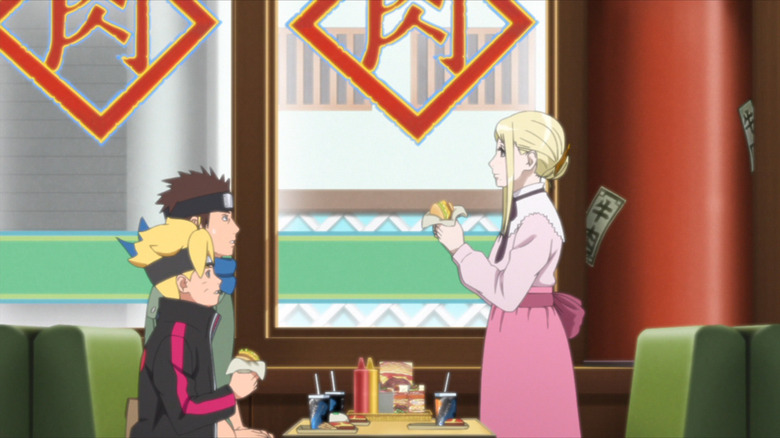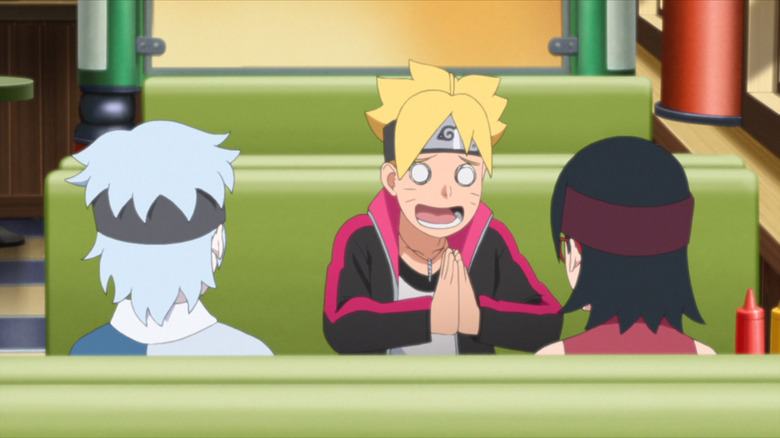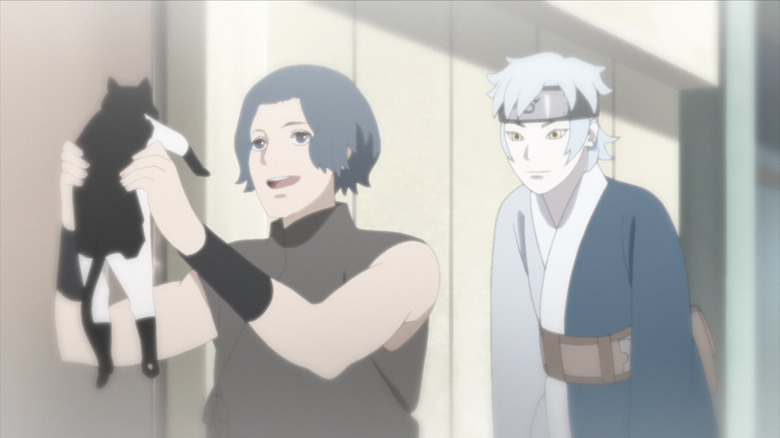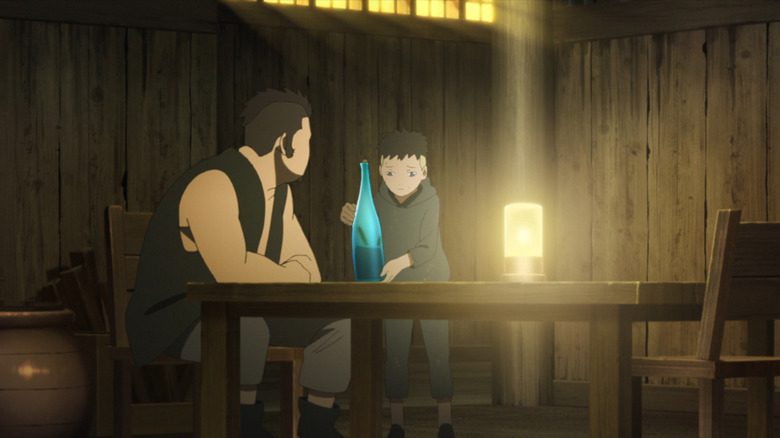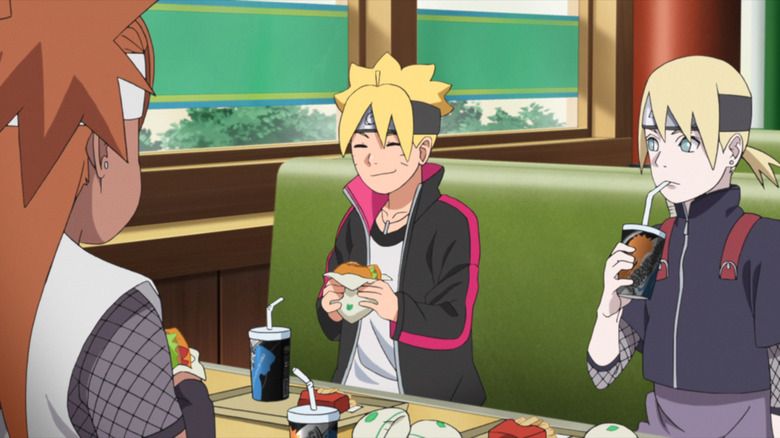Every Boruto: Naruto Next Generations Filler Episode You Can Skip
Though the stunning 500-episode saga that is "Naruto: Shippuden" (a follow-up to the original 220-episode "Naruto" series) drew to a close in March 2017, it was almost immediately followed by its spin-off, "Boruto: Naruto Next Generations." Taking up where Naruto left off by spotlighting the son of Naruto and Hinata Uzumaki, this slice-of-life dramedy comes complete with much of the action and characterization that made "Naruto" a sensation while scaling things down to size through a new POV. While Boruto was long a staple of the franchise, this is where his story shines.
This might not be quite the tale that "Naruto" was, but it's still very much worth the watch for fans of the original series. Picking up where the feature film "Boruto: Naruto the Movie" left off and filling in some blanks along the way, disaffected teen Boruto joins a team of ninjas to prepare for a vague impending threat that could be catastrophic not just for the village, but the world. Joined by his friends, Boruto follows in his dad's heroic footsteps but with a vibe that is all his own.
Here's the thing; just like "Naruto," "Boruto" is a ton of fun, and even when it doesn't have quite the impact of that original epic, it's still worth your time. With that in mind — and no shade toward this incredible franchise intended — these are the "Next Generations" episodes that you could probably go ahead and skip over if you're pressed for time.
Episodes 16-18
In "Crisis: The Threat of Failing!," Denki is struggling to keep up with his friends at The Academy, the school where ninjas learn their craft. Meanwhile, fellow student Iwabee struggles with arithmetic, which is Denki's strong suit. Though the two seem at an impasse, they ultimately find a way to work together to strengthen each other's weak points. In the end, they prove their mettle as a pair by prioritizing helping innocent people escape from a fire rather than rushing to make it to the tests they studied so hard for. Similarly, in the follow-up "Run, Sarada!," the growth of a supporting character is in the spotlight as the tightly wound Sarada is encouraged to let loose and have a little fun in life.
The adorable "A Day in the Life of the Uzumaki Family" is worth watching for some of that lowkey family bonding that fans enjoy, but, as it revolves around the family caring for Himawari as she struggles with a minor cold, it's not essential. Sure, it's heartwarming as it darts from character to character as the events of a regular day play out, complete with all the trials and tribulations that come from being an Uzumaki, but it's still filler. If you've got the time, these are all sweet stories about teamwork and family, but you can find that in other episodes that are a little more important to the overarching plot.
Episodes 40-41
"Team 7: The First Mission" kicks off with Boruto and his friends excited to be jumping into action with their first mission. Dismayed that they're expected to take on smaller tasks before moving up the ladder to more important missions, Boruto dismissively suggests that they rush through the job at hand just to get it over with. Sensing that his attitude might get him and others hurt, Naruto advises his son to take things more seriously and consider the impact their actions will have on people's lives. As the story progresses, it becomes clear that things are not all they seem with this seemingly minor job.
Villagers have been experiencing a series of attacks and thefts, causing a girl named Kiri to step in and attempt to curb the damage. These crimes are caused by bandits, and Team 7 is meant to expel them. Along the way, they discover that an elder has kidnapped and injured Kiri in an act of betrayal so that he might steal land and get rich. Naturally, this all ends in a big action sequence and the kids save the day. While it's clear that Boruto has a lot to learn about team dynamics and the importance of being self aware, "Team 7: The First Mission" and the follow-up episode "Strength in Unity" feature a learning curve that is addressed in the episodes that follow, so it's okay to hit fast forward here.
Episodes 48-50
"The Genin Documentary" kicks off with a group headed up by Iwabee trying to prove themselves after a highly ineffectual outing in the Byakuya Gang Arc. Hoping to drive an increase in new recruits to The Academy, they set out to make a documentary that will encourage others to join. They manage to catch some impressive footage, but only by frightening bystanders and causing destruction, leading Udon to step in. Udon bonds with the frustrated Iwabee by explaining that he also failed repeatedly on missions and simply had to keep trying regardless of his disappointments. When it counts, Iwabee steps in to save lives, and an entertaining short film is made.
Meanwhile, the episode "Wasabi and Namida" revolves around several animals being freed from the local zoo, with Team 15 leader Hanabi tasking the girls with tracking the animals and returning them safely to their homes. With Sumire keeping a small secret from the other two girls, the tension causes the situation to spin out of control, but it is regained when they realize that teamwork is the best strategy. Finally, "The Chunin Exams: The Recommendation Meeting" is mostly oriented around whether or not Boruto is prepared to take the next step in his training. His mentors and friends fear that he's come to rely too much on his luck, until he shows a surprising level of maturity harnessing a drunk Hanabi's escaped insects. These are all fun, but truth be told, not too much of real consequence happens here, and your overall viewing experience won't be impacted if you skip these three installments.
Episode 59
Most of "Boruto vs. Shikadai" revolves around the fight between Chōchō and Shinki, in which Shinki is dismissive and cruel to the underdog Chōchō. Though Shinki keeps knocking Chōchō down, she refuses to give up until she has to be physically dragged from the arena, making for a rather painful fight sequence. Chōchō gives it her all and it's impossible not to root for her, but this part of the story is mostly in service of building the threat that Shinki will pose to Boruto a couple of episodes down the line.
Afterward, the title fight of "Boruto vs. Shikadai" begins. Shikadai fails to pin Boruto and his clones, and Boruto struggles to land a hit on Shikadai's shadow self, and the two seem to be at an obvious stalemate until Boruto digs deep within to recall his father's many lessons. He draws up his strength to form one last clone, forcing Shikadai to dodge in a way that allows the other clones to catch him off guard. Though Boruto wins, there is a sense of dissatisfaction that permeates the episode as he struggles with unresolved feelings over the events of the tournament. Stories where the hero isn't nearly as triumphant as we'd like have their place, but this episode serves mostly as filler in the leadup to another fight that likewise doesn't particularly pay off.
Episode 61
Following the events of Episode 60, "The Hidden Leaf vs. The Hidden Sand," the final battle between Boruto, Shinki, and Sarada begins in "The Iron Sand User: Shinki." True to his previously established fighting style, Shinki immediately attacks them both at once, a bold move intended to keep them equally off balance throughout the fight. This grants Sarada and Boruto space to team up against their mutual opponent, recognizing his strength and attempting to find alternative methods of taking him out. When their attempt at a unified front falters and Shinki grabs hold of Sarada, an angry Boruto attacks him, giving Sarada space to free herself and launch an attack of her own.
Surprising them further, Shinki releases Sarada to make a strategic retreat by forming wings and flying back. Increasingly brutal due to the desperation of being put on the ropes for a change, Shinki attacks Sarada without mercy and takes her out of the fight while insulting and belittling Boruto's defeated friends. When Shinki pins Boruto, Boruto uses his full strength to escape and defeat him, but he bends the rules in doing so, which causes Naruto to disqualify his win on a technicality. This infuriates Boruto, who insists his father never has the time to talk to him when it matters, only when he's in trouble. With a worried Naruto noticing another threat flying high over the arena, this continues the theme of the Shinki episodes being full of bad vibes and hurt feelings that don't really add to the overarching story.
Episodes 67-69
This trilogy of episodes follows Chōchō as she's criticized for her interest in soap operas as well as her body type and dietary choices — she's cruelly encouraged to "slim down." Utilizing her family's Butterfly Mode, she appears instantly thinner to the point that Boruto doesn't even recognize her. Meanwhile, Chōchō is assigned to act as a bodyguard for two of the actors from her favorite soap, who are constantly under threat from stalkers. The stress of upholding the slimmer form in Butterfly Mode causes her to botch capturing an attacker, but she is then assigned a kissing scene with her soap opera crush. A number of onset disruptions cause the scene to be cut, stressing Chōchō out even further.
When she returns to her true form, her crush fails to recognize her and treats her badly, as does his acting partner, whose dress was ripped by Chōchō in an altercation. The toxic onset behavior continues to build with Chōchō attempting to navigate her hurt feelings and her desire to do the right thing. Though it all works out in the end (her crush finally sees her for who she is and develops an attraction to her), Chōchō is a bit exhausted by the whole ordeal and returns to her life, eating with her parents and putting the whole thing behind her. It's nice to see Chōchō get the spotlight for once, but these episodes are mostly just filler leading up to the next main story.
Episodes 93-97
Episodes 93, 94, and 95 revolve around how overworked Naruto is and how difficult he finds it is to juggle his responsibilities to his family and keep the village safe and functional. Exhausted and stressed, he manages to make it home to spend a holiday with his family only to immediately find himself in the pursuit of a toy for his daughter. This is followed by a full episode eating contest, then a surprise last-minute bonding with Naruto and Boruto as the son asks for his father to train with him before the holiday draws to an end. These episodes show the struggle and commitment issues of the Uzumakis as they try to navigate their wildly busy lives with their emotional needs, but those issues are on show in plenty of other episodes, making the Parent and Child Day Arc a bit of an unnecessary tangent.
Following this, the episodes "Blood, Sweat, and Namida" and "Shikadai's Decision" dive into the challenges that these two supporting characters face, but neither episode has much in the way of ongoing ramifications for Boruto's story at large. Showing the level of pressure that those in training at The Academy are under while fleshing out their emotional lives is always a welcome treat, but both of these stories are filling space in anticipation of the Jugo Arc, which kicks off with Episode 98, "The Cursed Forest."
Episodes 106-111
The spotlight is on Mirai at the onset of The Steam Ninja Scrolls Arc, as she gets assigned to accompany Kakashi and Might Guy to the hot springs. Mirai's overly serious nature is on full display as she constantly suspects others of being potential enemies, which is only exacerbated by her memories of her deceased father. As the story progresses, they arrive at a festival with the purpose of celebrating the roles that dogs and cats play in people's lives, but Mirai continually finds herself unable to relax and enjoy the trip. Of course, even when Mirai makes the effort to take things down a notch, the world around her continues to be a stressful place.
Fleshing out Mirai's character is always a welcome diversion, but in the end, this batch of half a dozen episodes is quite literally just that: a diversion. We follow her interactions with others and feelings of regret around her father's death, which leads her to the resurrection hot springs. A murder mystery in which local women have gone missing is solved as she realizes a supposed ability to communicate with the dead is a sham, and the guru behind it all is guilty of using the missing women to fuel the longevity of his life. Ultimately, this is a lesson about making peace with the past and accepting the future with open arms, but it's nothing groundbreaking. This is a great arc for Mirai megafans, but it can otherwise be passed over.
Episodes 113-114
With Shikadai only recently climbing the ranks to achieve the role of team captain, "The Qualities of a Captain" follows his first mission as a leader. Immediately troubled by Boruto's tardiness and Iwabee and Wasabi's bickering, the stress is on as Shikadai commits to the goal of retrieving a rare medicinal flower from atop a mountain. To help them achieve this goal, Shikadai has recruited the help of Tonsuke, the cherished pig who can track the scent of the plant. Naturally, having a temperamental and easily frightened pig that requires constant treats derails everything, as the team is beset by wolves and bandits along the way. This is a good episode in terms of Shikadai's growth as a captain, but otherwise this one is skippable.
Likewise, "X Cards Proxy War!" is an entertaining tangent but it doesn't particularly go anywhere. Following along with the group as they collect coveted Extreme: Shinobi Picture Scrolls card packs and vie to find the best ones, Boruto is disheartened when he gets yet another repeat card of his father, continuing the theme of his constant reminders of his father's greatness while he's trying to forge his own path. At this point, over a hundred episodes into the show, there's nothing new to be gained from this. Like the previous entry, Episode114 is a lot of fun, but it's a bit of a dead end in terms of the story.
Episodes 116-119
Sparks are flying in the Konohamaru's Love Arc, which begins in Episode 116 and ends in Episode 119. All four episodes, which deal with Konohamaru falling for the mysterious Remon, are filler that can be skipped. While Remon and Konohamaru clearly experience a connection, Boruto is oblivious (nothing new there), not realizing that his friend has caught feelings late in the episode. When they visit her isolated home, she abruptly tells them both to leave her alone, stunning the pair. This leads to the unveiling of Remon's secret in the episode of the same name, during which we learn that Remon is not just engaged but also being held captive by her fiancé.
A descendant of a shrine maiden that battled a memory-eating demon named Soma, Remon and her village are under constant threat from the demon. The seal that holds it in place regularly weakens and they all begin to lose their memories. It turns out that her husband-to-be is more involved in all of this than he lets on, and, by the end, Remon has lost a lot in the fight against Soma. We'll keep the ending to ourselves in case you want to take a stroll down Bittersweet Lane with these episodes, but, despite telling a beautiful story, they still qualify as filler due to their disconnected nature and the introduction of characters and circumstances that don't play any further part.
Episodes 138-140
Episode 138, 139, and 140 of "Boruto" can be skipped with little consequence. Starting with "Hiashi's Birthday," this trilogy of filler episodes is emotionally fulfilling in some ways, but it's clearly just killing time. Boruto's puzzlement about the things that motivate Hiashi takes the spotlight as he first struggles to think of a proper gift for the party and then later point blank asks Hiashi why he allows others to show him disrespect. Reflecting on the way the Hyūga Affair changed him, Boruto comes to understand Hiashi better by the end of "Hiashi's Birthday." The following episode, "The Terror! Enko Onikuma," is a cute sidetrack into Team 40's attempts to recover a lost pet, which leads to them bonding and becoming a stronger group as a result.
Wrapping up this loosely connected trilogy is "The Mind Transfer Jutsu that Lost to Potato Chips," a similarly lightweight side quest following Team 10 as they thwart a criminal one night. Inojin is reluctant to jump into action after various past failures. Though Shikadai picks up the slack, Inojin's hesitance becomes the focus of the episode as he works to overcome his hang-ups. As he tries to hone his mind transfer powers, situations get increasingly out of control, but he finds his motivation with a little help from Chōchō. These character-centric forays may entertain fans of those involved, but if you skip them, you really won't be missing much.
Episodes 155-156
"Mitsuki's Rainy Day" shows Mitsuki finding his pet Mikazuki during a storm, and the cat then helps him to save the life of an injured man named Samidare, who is bleeding out in an alley. Mitsuki treats his wounds and takes him back to his apartment. When the stranger wakes up, he explains that he's attempting to visit his sister who works for a notoriously corrupt chemical company. It is suggested that he is a victim of a serial killer referred to as the Rain Killer, and a murder mystery ramps up, with Mitsuki tasked with solving it. Along the way, Mitsuki bonds with the clever and helpful Mikazuki.
In the following episode, "I Can't Stay In My Slim Form," Chōchō takes the spotlight. It focuses on her lack of discipline as she fails to hold the Butterfly Mode seen in previous episodes. She gets bribed with sweet beans to continue training, but a local shop owner explains that the supply chain has been disrupted by constant thefts. Motivated by her love of the treat, Chōchō gets involved. Discovering that restoring her calories helps her keep focus and hold her Butterfly Form, she captures the bean thieves and enjoys the triumph. Mitsuki and Chōchō are both great supporting characters, but these episodes are definite stall-outs that offer nothing in the grand scheme of things.
Episode 192
There's no denying that Kawaki had a rough childhood, and Episode 192 shows him reflecting on the struggles of his youth. In "The Past," we see Boruto's apparent future nemesis desperately struggling to chop wood in hopes of making ends meet during a severe economic recession and a widespread plague-like illness. His father is abusive and uses all the money he makes to buy alcohol. Still, Kawaki dreams of attending a festival and seeing many colorful goldfish. His no-good old man dismisses his interest in this and even denies him dinner as punishment.
Tragically, Kawaki is still loyal to his father and defends him against the taunts of other children. Meanwhile, the goldfish merchant that informed Kawaki of the festival shares with him that he had a similarly painful childhood, and offers to show him the tricks of his trade. Kawaki insists on continuing to help his father, but his dad cruelly offers to sell him. This episode is absolutely brutal, and the twist at the end makes it all the worse — we see how much Kawaki has to overcome to establish basic trust in others. Heartbreaking and relentlessly bleak, "The Past" is an incredible story, but all it really does it tell us what we already knew: Kawaki had it rough growing up. Other than that, it offers very little , making it an easy episode to skip if you're only interested in the main story.
Episodes 256-258
In "The Ultimate Recipe," we return to Boruto's beloved Lightning Burger as Team 7 and Team 10 meet up for a meal and catch up on recent events. Meanwhile, Chōchō and Inojin become concerned that they're holding their team leader Shikadai back and that he might do better with a more advanced group. By the end of the episode, it's clear that everyone has their part to play, and, while Shikadai is indeed ahead of the curve in many ways, he relies on his team just as much as they rely on him. It's all very sweet, but it's also pretty forgettable.
Next, in the episode "Konohamaru Becomes the Hokage?!," Naruto is asked to guest star in a Kagemasa movie, but he already promised his family that they would go on a hot spring vacation together. The film shoot clashes with the trip, so Konohamaru offers to go to the set in place of Naruto. While the producer, director, and star all lose sight of what makes their films great, Konohamaru is on set to remind them, and the film turns out to be a success.
After that, the episode "The Uzumaki Family's Hot Springs Vacation" fills in the blanks in regard to the trip Naruto was so eager to go on. Though the locale is beautiful, we all know by now that the Uzumakis can't go anywhere without some kind of debacle. The inn the family is staying at is ever so slightly haunted, but, of course, Boruto is able to get through it all okay. Fun, endearing, but far from essential, these three episodes are yet more examples of filler that you can skip.
